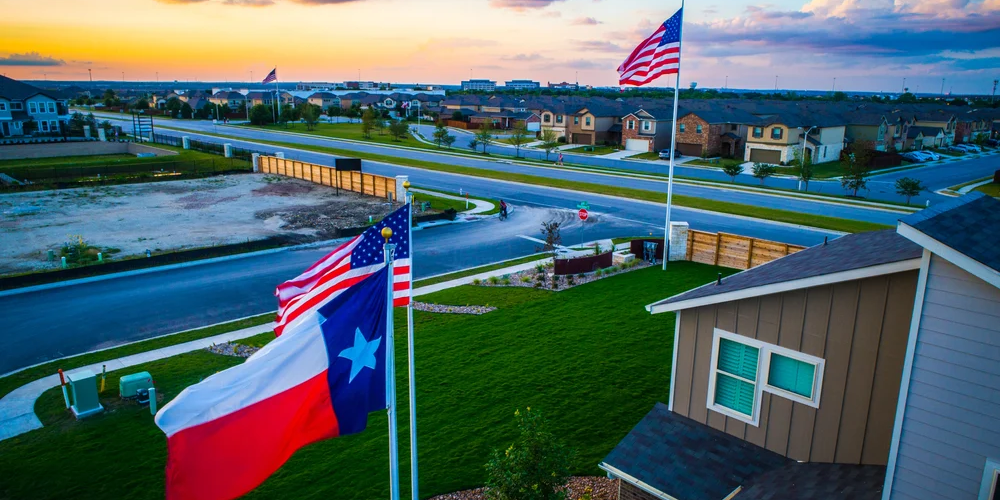Home Owners Associations are the new normal in the Lone Star State
While some forms of community coalitions existed as far back as the 19th century, the first official homeowners association in the United States was established around 1905 in Pasadena, California, and HOAs have come a long way since.
Texas is ranked third among the most HOA-abundant states in the nation, with over 6 million Texans living in the more than 21,000 HOAs in the state — at least 213 of which are in Denton County alone. The associations established a footing during the suburban development boom of the early 1960s after the Federal Housing Administration approved federal mortgage insurance for homes in areas with qualifying associations.
HOAs gained more steam after the Clean Water Act was passed in 1977. The act required neighborhoods to establish retention ponds to control stormwater runoff, and with the compulsory shared spaces came the need for central management.
Today, most HOAs offer more than stormwater management to residents, usually in the form of shared amenities like pools and green spaces and enforcement of neighborhood covenants — governing documents that outline what is and isn’t allowed in a subdivision. In exchange, residents pay an annual or monthly fee and agree to comply with neighborhood rules.
“Originally, the driver was water, but later, the driver just becomes the amenities and green spaces that subdivisions have that have to be managed, so as a practical matter, you’ve got to have an association to do that,” said Patrick Sutton, a real estate attorney who specializes in HOA law and property rights.
It’s that need for a governing body to handle community matters that makes them essential to residential developments — and promotes heated debates among homebuyers.
Protecting peace — and property values
Imagine you buy a home in a quiet residential neighborhood away from the hustle and bustle of city life. A few months later, the house next door sells to a property management company that plans to turn it into a short-term rental marketed as a party house. Suddenly, your oasis has become anything but.
It’s scenarios like this, proponents say, that make homeowners associations and neighborhood watchdog groups vital to maintaining order in neighborhoods.
“We are just neighbors, families, parents trying to raise our kids and families in fairly safe, peaceful environments,” Andrew Muras, who co-founded the Texas Neighborhood Coalition after trouble with short-term rentals in his neighborhood, told the Denton Record-Chronicle last June.
Leasing rules, which may restrict things like short-term rentals, require background checks for new tenants and establish other basic requirements for leases, help protect neighboring homeowners, according to Muras.
HOAs are also well known for establishing and enforcing architectural, landscaping and maintenance standards aimed at maintaining property values. Many studies have demonstrated a positive relationship between HOA management and home values, and HOAs are aimed at eliminating nuisances that could contribute to value dips such as unkempt yards, code violations and unsightly paint jobs.
So why have HOAs become such a hot-button issue among homeowners?
When property rights come under fire
One of the main problems Sutton sees clients run into is boards changing rules, or creating new ones, that homeowners say infringe on the rights they had when they bought their property. Those amendments to the neighborhood’s governing documents can be pushed through without the approval of a majority of homeowners, so long as the changes passed a quorum vote.
“People buy in a subdivision, for example, because they want to have leasing rights or they want to have [golf] courses or because they want to have a 1,000-square-foot house,” Sutton said. “When other owners get wind of what they’re doing, they get together and vote to impose new restrictions which take away important rights people thought they were buying.”
While many states don’t allow associations to change restrictions in a way that strips homeowners of pre-existing rights, or require that established owners be grandfathered in, Texas does not. It could also mean that amenities homeowners sought out at the time of sale are later eliminated, resulting in a substantial change to the neighborhood’s appeal for some foregone buyers.
What’s more, residents who sought to avoid HOA membership altogether by buying outside of an association neighborhood could be forced into an HOA or face foreclosure. Sutton argued a similar case in front of the Supreme Court last autumn — a non-association member threatened with losing their home if they didn’t comply with, and pay dues for, a new mandatory HOA.
So, what remedies do homeowners with an unresolvable HOA issue have? Not many. While legislation like Senate Bill 1588 places restrictions on what associations can do, local enforcement is scant.
“The only enforcement is people suing one another, and it’s very complicated legislation,” Sutton said. “The courts really don’t understand the legal landscape for HOAs very well.”
When cases do end up in court, judges often rule in favor of the HOA if they’ve filed governing documents with the county clerk’s office — which amounts to boards effectively giving themselves power, Sutton said.
Texas lawmakers typically introduces legislation each session to address HOA overreach, though many bills never make it out of committee. In the meantime, battles between homeowners and HOAs continue to play out in court, and the associations — for better or worse — aren’t going anywhere anytime soon. Short of buying land in a rural area and building a home yourself, you could end up in one sooner or later.
“As a practical matter, it probably is very difficult for a developer to create a new subdivision, which is attractive to buyers that does not also have a homeowners association,” Sutton said.
souurce: detonrc.com

